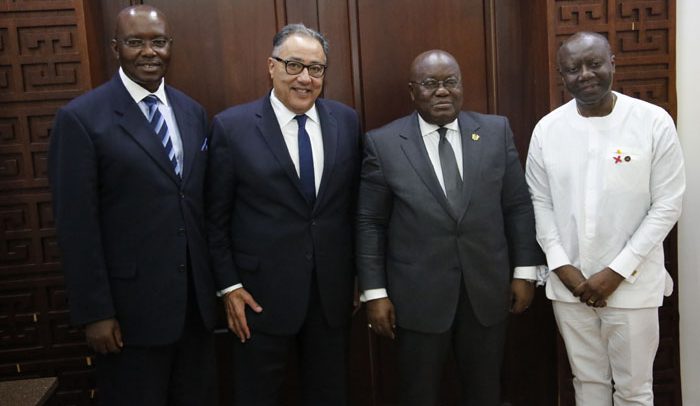President Akufo-Addo with Hafez Ghanem, Vice President Africa Region (2nd left), Ken Ofori (right), and Henry G. R. Kerali (left), Country Director, Ghana Liberia and Sierra Leone.
The Akufo-Addo administration has earned the praise of the World Bank (WB) over the implementation of the Free Senior High School (SHS) polic
Vice President of the World Bank, Hafez Ghanem, said the government’s ability to implement the policy is indicative of its determination to move the country towards the path of prosperity.
The World Bank deputy boss made the remarks when he paid a courtesy call on President Akufo-Addo at the Jubilee House in Accra yesterday.
He said, “We are very supportive of your decision to make all education up to secondary school free; I think this is extremely important and we would like to help as much as possible.”
He is in the country on a three-day mission to discuss macroeconomic, fiscal and monetary policies and highlight opportunities for investing in education and booming digital economy.
His visit comes at a time Ghana is finalizing plans to exit the International Monetary Fund (IMF) programme, with an assessment team currently reviewing its viability.
The country has been entered into IMF programmes for not less than 16 times.
If Ghana passes the combined 7th and 8th Extended Credit Facility by the end of March, the final tranche of funds totalling about $188 million would be released, which would bring total disbursements under the programme to about SDR 664.20 million ($920.58 million).
The World Bank deputy boss added, “So anything we will do to keep the children, both boys and girls in school until the end of secondary school is very critical and we will be delighted and help as much as we can.”
For him, the trend in Africa whereby young girls, who must be in school give birth at the expense of their education, have demographic and developmental implications.
President’s take
President Akufo-Addo pledged to shun complacency and touched on plans by his government to redefine basic education in Ghana by making basic and secondary education compulsory.
According to him, this would become a strong legal weapon for ensuring that all children, especially girls of school-going age, stay in school until at least they complete secondary education.
Although he acknowledged the fact that the country’s constitution makes provision for basic education to be free from kindergarten to junior high school (JHS), he said the new law would push it to senior secondary school level.
President Akufo-Addo expressed appreciation to the World Bank and other institutions such as the International Monetary Fund (IMF) for being ‘proactive’ to the cause of Ghana.
He said Ghana has benefitted from not less than $11 billion from the bank and added that he considers the country to be at the crossroads in its development.
“The fragile raw materials producing economy for a century cannot be allowed to continue, we have to find a way of modernizing the economy to produce things locally so that Ghana could export finished goods to attract high value in international exchanges, and providing the human capital of Ghana with best of tools such as information communication technology capability and shaping the educational system to allow most, if not all the young people, access education,” he added.
By Charles Takyi-Boadu, Presidential Correspondent


